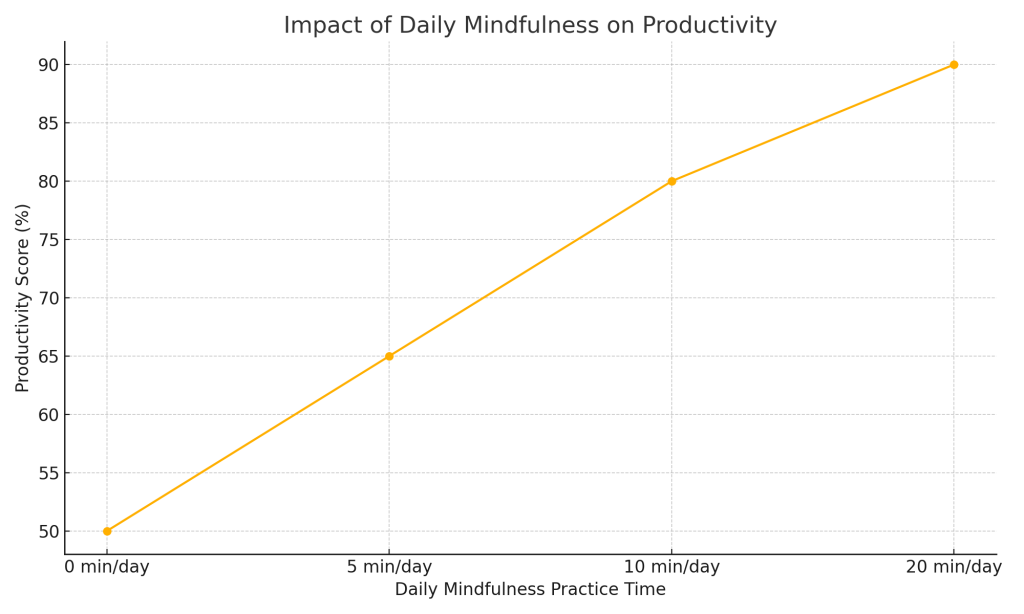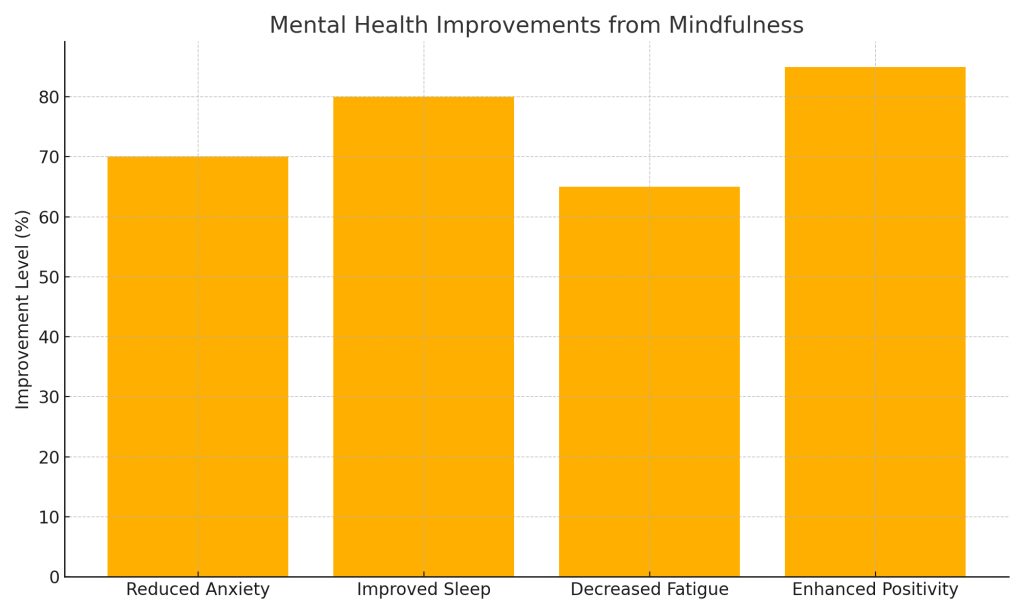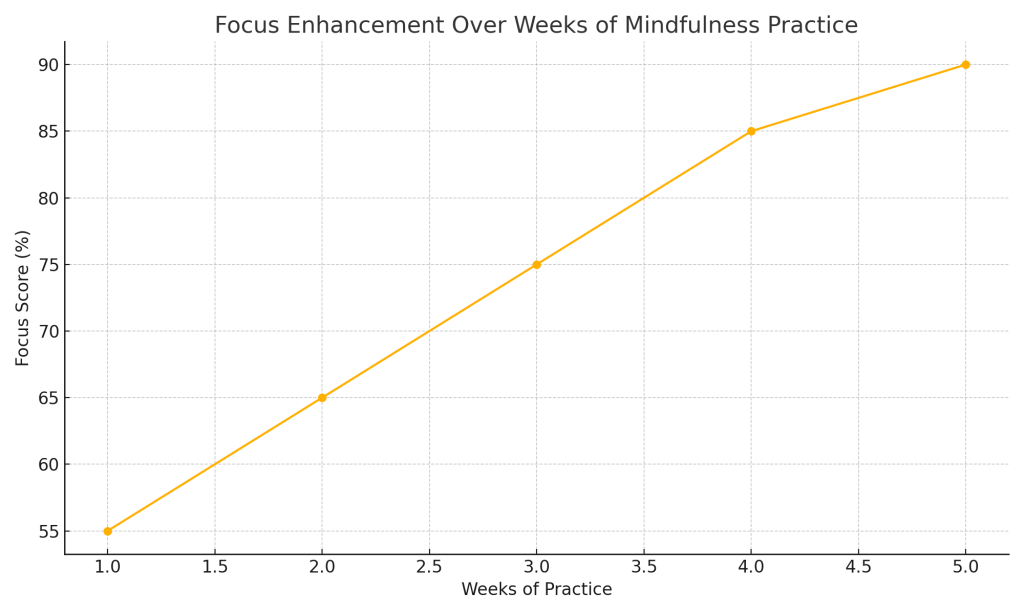In today’s fast-paced and ever-demanding world, Mindfulness Improves Productivity and Mental Health as a transformative practice for boosting productivity and nurturing mental health. By helping individuals remain present and focused, mindfulness reduces stress, enhances clarity, and fosters a sense of balance. For Australians juggling work, personal life, and digital distractions, embracing mindfulness can lead to profound benefits. This blog explores how mindfulness can significantly improve productivity while also safeguarding mental well-being, offering practical insights and tips for incorporating it into daily life.
The Science Behind Mindfulness
Mindfulness is the practice of being fully present in the moment, without judgment or distraction. Research shows that regular mindfulness practice can reshape the brain through neuroplasticity, enhancing areas associated with attention and emotional regulation.
Studies have also revealed that mindfulness reduces the production of cortisol, a stress hormone, and boosts the production of serotonin, a neurotransmitter linked to happiness. This biochemical shift not only improves mental health but also sharpens focus, allowing individuals to perform tasks with greater efficiency.
How Mindfulness Boosts Productivity
Mindfulness enhances productivity by training the mind to focus on one task at a time, eliminating the inefficiencies caused by multitasking. When the mind is clear and free from unnecessary stress, individuals can approach tasks with improved creativity and problem-solving skills.

Key benefits include:
- Improved Focus: Mindfulness increases the brain’s ability to sustain attention, reducing the likelihood of being derailed by distractions.
- Enhanced Decision-Making: By calming the mind, mindfulness fosters a thoughtful and deliberate decision-making process.
- Greater Resilience: Practicing mindfulness builds resilience, enabling professionals to bounce back quickly from setbacks and maintain productivity.
The Mental Health Benefits of Mindfulness
Mindfulness is a powerful tool for mental health, offering a host of benefits such as reducing anxiety, combating depression, and fostering emotional balance. For Australians, where mental health challenges affect a significant portion of the population, mindfulness provides a practical, accessible solution.

Mindfulness-based cognitive therapy (MBCT) and mindfulness meditation are proven methods for managing symptoms of anxiety and depression. Regular practice can help individuals break free from negative thought patterns and cultivate a more positive outlook.
Simple Ways to Incorporate Mindfulness into Daily Life
Integrating mindfulness into your routine doesn’t have to be time-consuming. Here are a few simple strategies:
- Start Your Day with a Mindful Moment: Spend 5 minutes focusing on your breath or setting an intention for the day.
- Practice Mindful Eating: Pay attention to the taste, texture, and aroma of your food.
- Take Breaks: Incorporate short mindfulness breaks throughout your day to reset and recharge.
- Use Apps: Apps like Headspace, Smiling Mind, and Calm offer guided meditations and mindfulness exercises tailored for busy schedules.
- Reflect at Day’s End: Spend a few minutes reflecting on the day’s events, focusing on what went well and expressing gratitude.
Daily Mindfulness Practices Summary
| Mindfulness Practice | Time Commitment | Associated Benefits |
|---|
| Morning Breathing Exercise | 5 minutes | Enhances focus, sets a calm tone for the day |
| Mindful Eating | 10-15 minutes | Improves digestion, fosters appreciation for food |
| Short Meditation Breaks | 5-10 minutes (2-3 times/day) | Reduces stress, improves clarity and focus |
| Journaling Gratitude | 5-10 minutes | Promotes positivity, reduces anxiety |
| End-of-Day Reflection | 5-7 minutes | Encourages gratitude, fosters emotional balance |
Case Studies: Mindfulness in Action
Australian workplaces are increasingly recognising the value of mindfulness. Companies like Atlassian have integrated mindfulness programs to reduce employee stress and boost productivity. Employees report feeling more engaged, creative, and focused, demonstrating the tangible impact of these practices.

Educational institutions in Australia are also embracing mindfulness, teaching students techniques to manage stress and improve academic performance. These case studies highlight how mindfulness can be applied in diverse settings to achieve positive outcomes.
Conclusion
Mindfulness is not just a personal wellness tool but a productivity booster that can revolutionise how we approach work and life. By improving focus, enhancing emotional resilience, and fostering mental clarity, mindfulness helps individuals navigate challenges with grace and effectiveness. For Australians striving for balance amidst life’s pressures, mindfulness offers a sustainable path to greater productivity and mental well-being. Start small, stay consistent, and witness the transformative power of mindfulness in your daily life.



